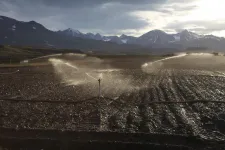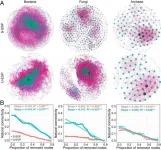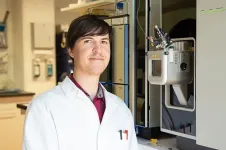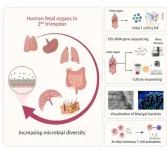(Press-News.org) ENVIRONMENT Diesel-polluted soil from now defunct military outposts in Greenland can be remediated using naturally occurring soil bacteria according to an extensive five-year experiment in Mestersvig, East Greenland, to which the University of Copenhagen has contributed.
Mothballed military outposts and stacks of rusting oil drums aren't an unusual sight in Greenland. Indeed, there are about 30 abandoned military installations in Greenland where diesel, once used to keep generators and other machinery running, may have seeped into the ground.
This is the case with Station 9117 Mestersvig, an abandoned military airfield on the coast of East Greenland. Forty tons of diesel fuel contaminated the soil at Mestersvig. As a result, Danish Defence and NIRAS, an engineering company, initiated an experiment to optimize the conditions for naturally occurring soil bacteria to break down soil contaminants.
Bacterial populations and the biodegradation of diesel compounds were continuously monitored by scientists from the University of Copenhagen's Department of Plant and Environmental Sciences and the Geological Survey of Denmark and Greenland (GEUS). After five years, the researchers found that the bacteria had bioremediated as much as 82 percent of the 5,000 tons of contaminated soil.
"The bacteria have proven extremely effective at breaking down the vast majority of the diesel compounds. As such, this natural method can be applied elsewhere in the Arctic, where it would otherwise be incredibly resource-intensive to remove contaminated soil by way of aircraft or ship," explains Professor Jan H. Christensen of the University of Copenhagen's Department of Plant and Environmental Sciences. Christensen has been responsible for analyzing the chemical fingerprints in the diesel-contaminated soil.
Never thoroughly studied and documented
The method, known as landfarming, is most often associated with warmer climates around the world. Prior to this project, landfarming had never been tested on a large scale under Arctic conditions. Nor had the method ever been as thoroughly studied and documented as in this experiment.
Landfarming works by distributing contaminated soil in a thin layer, which is then ploughed, fertilized and oxygenated every year to optimize conditions for bacteria to degrade hydrocarbons.
Watering the field
Landfarming works by distributing contaminated soil in a thin layer, which is then ploughed, fertilized and oxygenated every year to optimize conditions for bacteria to degrade hydrocarbons. Photo: Anders Christian Vestergaard
According to Anders Risbjerg Johnsen,a microbiologist and senior research scientist at GEUS, the landfarming work resulted in regular explosions of soil bacteria, which he was able to keep track of from Denmark using advanced samples of soil bacteria.
"Having a wide variety of hydrocarbon-degrading bacteria is essential as the 10,000 various diesel compounds contaminating the soil require different degradation pathways to be broken down," explains Johnsen.
Ability to clean up abandoned bases
Warmer "summer" temperatures of between 0 and 10 degrees only last about three months in Mestersvig. For the rest of the year, the soil is frozen. Thus, it was uncertain whether Greenlandic soil bacteria could break down the leaked diesel as effectively as bacteria in warmer conditions.
Fortunately, the study demonstrated that the bacteria could easily degrade diesel contaminants in the soil, despite the frigid temperatures. In the future, the researchers hope that naturally occurring bacteria can be used to remediate contamination in the Greenlandic environment at roughly 30 other deserted installations. The lack of infrastructure has made it extremely expensive and resource-intensive to move soil around as, for example, might be done in Denmark.
"Some degree of diesel pollution can be found at nearly every Arctic site where there was once a weather station, research station or military installation. It is likely that the approach used in our experiments can be used at many of these sites," say Jan H. Christensen and Anders Risbjerg Johnsen.
The researchers are returning to Greenland this year to conduct new studies on the experiment. They hope to find that the bacteria have successfully degraded all remaining diesel contamination.
INFORMATION:
Read the scientific article
These findings were published in the journal Cellular and Molecular Life Sciences on 8 June 2021.
Huge splicing diversity in the brain
The human genome was sequenced around 20 years ago. Since then, the sequence information encoding our proteins is known - at least in principle. However, this information is not continuously stored in the individual genes, but is divided into smaller coding sections. These coding sections, also known as exons, are assembled in a process called splicing. Depending on the gene, different exon combinations are possible, which is why they are referred to as different or ...
With increasing vaccination rates and decreasing numbers of infections, the population's feeling of safety is also rising. As the results of the 37th edition of the BfR-Corona-Monitor, a regular survey conducted by the German Federal Institute for Risk Assessment (BfR), show, the majority of the population in Germany thinks it can control its risk of an infection well. "62 percent are confident that they can protect themselves from an infection with the coronavirus," says BfR-President Professor Dr. Dr. Andreas Hensel. "We see that the feeling of safety has increased considerably. ...
Chinese researchers have recently discovered links between reduction in microbial stability and soil carbon loss in the active layer of degraded alpine permafrost on the Qinghai-Tibet Plateau (QTP).
The researchers, headed by Prof. CHEN Shengyun from the Northwest Institute of Eco-Environment and Resources (NIEER) of the Chinese Academy of Sciences (CAS), and XUE Kai from University of Chinese Academy of Sciences, conducted a combined in-depth analysis of soil microbial communities and their co-occurrence networks in the active permafrost layer along an extensive gradient of permafrost degradation.
The QTP encompasses the largest extent of high-altitude mountain ...
Greater Helsinki -- Transitioning to low-carbon energy production is the biggest climate challenge to overcome. Many countries are already looking to adopt clean heating solutions more widely, with the International Energy Agency projecting that by 2045 nearly half of global heating will be done with heat pumps. To ensure speedy uptake, governments are likely to offer subsidies to ensure these energy-efficient options actually make their way into homes and offices.
A new study from Aalto University assesses the impact of heat pumps on energy consumption as well as how ...
Research published in the journal ACS Materials and Interfaces has provided new understanding of how false-negative results in Lateral Flow Tests occur and provides opportunity for simple improvements to be made.
Lateral Flow Devices were introduced late in 2020 on a global scale to help detect novel coronavirus infection in individuals, with test results produced rapidly in half an hour or less. However, their potential has been somewhat hindered by inadequate sensitivity, with a high number of false-negative results.
Using X-ray fluorescence imaging from Diamond Light Source, researchers from King's College London ...
Researchers from the University of Kent's School of Psychology have found that when people are presented with the idea of a Covid-19 "immunity passport", they show less willingness to follow social distancing and face covering guidelines. However, this willingness seems to return when people read more cautious information about Covid-19 immunity.
PhD students Ricky Green and Mikey Biddlestone and Professor Karen Douglas asked participants from the UK and USA to imagine they had either recovered from Covid-19 or were currently infected. Participants asked to imagine ...
Several different causes of ageing have been discovered, but the question remains whether there are common underlying mechanisms that determine ageing and lifespan. Researchers from the Max Planck Institute for Biology of Ageing and the CECAD Cluster of Excellence in Ageing research at the University Cologne have now come across folate metabolism in their search for such basic mechanisms. Its regulation underlies many known ageing signalling pathways and leads to longevity. This may provide a new possibility to broadly improve human health during ageing.
In recent decades, ...
In an international study published by the journal Environment International, the University of Surrey led an international team of air pollution experts in monitoring pollution hotspots in 10 global cities: Dhaka (Bangladesh); São Paulo (Brazil); Guangzhou (China); Medellín (Colombia); Cairo (Egypt); Addis Ababa (Ethiopia); Chennai (India); Sulaymaniyah (Iraq); Blantyre (Malawi); and Dar-es-Salaam (Tanzania).
Surrey's Global Centre for Clean Air Research (GCARE) set out to investigate whether the amount of fine air pollution particles (PM2.5) drivers inhaled is connected to the duration drivers spend in pollution hotspots and socio-economic indicators such ...
2 June 2021, Singapore - The human fetal immune system begins to develop early during gestation, however, factors responsible for fetal immune-priming remain elusive. Using multiple complementary approaches, Dr Florent Ginhoux from A*STAR's Singapore Immunology Network (SIgN), Professor Jerry Chan from KK Women's and Children's Hospital (KKH), Professor Salvatore Albani from the SingHealth Duke-NUS Translational Immunology Institute, with collaborators from Cambridge University explored potential exposure to microbial agents in-utero. The team identified live microbes across fetal organs that stimulate activation of fetal T-cells during the second trimester of gestation. Study published in scientific journal, Cell, on 24 June 2021.
The team profiled microbes ...
Do you like the thick brush strokes and soft color palettes of an impressionist painting such as those by Claude Monet? Or do you prefer the bold colors and abstract shapes of a Rothko? Individual art tastes have a certain mystique to them, but now a new Caltech study shows that a simple computer program can accurately predict which paintings a person will like.
The new study, appearing in the journal Nature Human Behaviour, utilized Amazon's crowdsourcing platform Mechanical Turk to enlist more than 1,500 volunteers to rate paintings in the genres of impressionism, cubism, abstract, and color field. The volunteers' answers were fed into a computer program and then, after this training period, the computer ...




